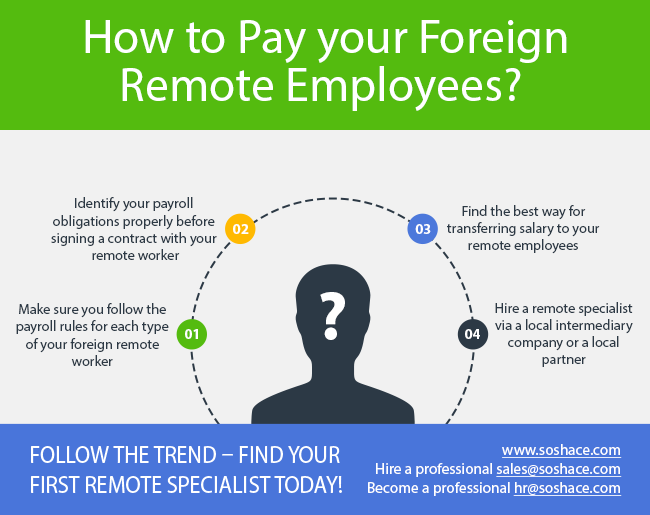It is becoming more and more popular to hire remote specialists not only for the short-term projects but also on a long-term basis. Companies prefer to do this for the following reasons:
- If your team members are working remotely then your company can save money on renting large office spaces.
- If your company hires a remote team (for example, web developers, coders, software developer, app developers or programmers) it can give your business an opportunity to grow because you can invest saved funds into other areas of business.
- Your company can attract top professionals worldwide, because the most qualified specialists may be located overseas.
- If you hire remote specialists, you may get highly engaged and motivated team members and increase the overall productivity of your company.
- Your company can reduce sick absences, because the remote employees can work from home without infecting others or return to work quicker.
- You may save money on the payroll, because you can hire remote specialists with the low local rates.
As we have mentioned, there are a lot of advantages of hiring remote specialists, but it is important to know the local remote employee payroll legislation in order to avoid the legal problems in future. You should always remember that depending on where your remote employees reside different laws may be applicable.
Make sure your company hires an independent contractor
After you successfully identify whether your foreign remote worker is an employee or an independent contractor you can start to plan your payroll properly. You should double check whether your remote specialist is an independent contractor or not, because if it turns out that the worker is actually an employee according to the local legislation, it may cause your American company serious problems (See our article “Top 6 Things every American company should do before hiring a Foreign independent contractor). You should not take your remote workers words for it, because they probably don’t know their local legislation too.
Your remote worker, in most cases, but not in all of them, is an employee if he/she:
- is working a full working day to supply your company 5 days a week.
- your control the way the tasks are being delivered.
It is better not to rely on this easy explanation and in every single case check the worker status according to the local jurisdiction standards before you start the payroll. This matter is not always so clear and may cause your company serious legal consequences.
Identify your payroll obligations properly before signing a contract with your remote worker
The main obligation which may occur is withholding and paying an income tax for your remote employee. If your company is a tax resident of the USA and your employee is working in another country, you should comply with the income tax legislation of the local country of employee and withhold an income tax at the local rate of his/her country residency. Your company should also remember to make payments to the local pension and healthcare funds, consider minimum local wage laws, overtime legislation and other benefits which are compulsory in the country of residency of your remote employee.
Another issue after withholding the correct amount of your employee income tax is paying it correctly to each separate tax and social security office (fund). This may become very hard to manage, because, for example in the Post USSR countries, even a professional bookkeeper can make mistakes while producing such payments due to the reason that the Russian tax authorities are changing their bank account details very often and the way they inform their tax payers does not always seem to be efficient.
Find the best way for transferring salary to your remote employees
Before hiring a remote specialist, you both need to decide which way to pay a salary to your remote team. You should try to identify the best way to transfer funds to them with an attractive exchange rate fee, because in many countries (for example in Russia) it is compulsory to pay salary in the local currency. A question may come up to your mind. Why not to use the Western Union or Moneygram services? The answer is easy. If you are hiring a remote employee, your company is responsible for withholding their local rate income taxes and making payments for them accordingly.
Then how to use the benefits of hiring a professional remote specialist and minimize the logistics risks?
1)Outsource a local payroll to a dedicated payroll company
It may seem to be a brilliant idea, but the U.S. payroll companies may charge a lot for doing this work for you, which will dramatically increase the cost of hiring a remote professional.
2)Hire in-house payroll staff
If you company is large enough you may consider this option, although the responsibility for the overall corporate legislation compliance will be on the management of the company and you cannot guarantee that your American accountant or bookkeeper would not accidentally break the payroll and tax legislation of your remote employee local country. In addition, it also increases the cost of hiring a remote specialist.
3) Hire a remote specialist via a local intermediary company or local partner
The easiest and the mostly attractive way for your American company to hire a remote employee is to do it via a local intermediary company, which may become your business partner. One of the best options of doing this is hiring a specialist via a remote freelance marketplace (like Soshace, if you are looking for a remote web developer for your project).
Such partner or company would produce all the background checks and pre-hiring assessment for your company. Find you the right candidate for your web development project. Especially that’s important when you are hiring a remote web developer, because the majority of business owners do not have the appropriate web development skills and can hardly assess the real level or the candidates’ professionalism in this sphere. At Soshace professional web developers are testing all the remote specialists before they start to work for our clients.
Regarding the payroll issues, our company is working in compliance with the international common law and Russian law standards, and are playing an intermediary role in the payroll to the remote specialists.
It means that your American company:
- would sign an agreement with Soshace;
- we would find you the right candidate for your web development project;
- prepare a contract (harmonized in accordance with the international law standards);
- sign it;
- provide our corporate bank account for receiving all the hourly-rate payments to your remote worker (so-called salary);
- as a local company, we will pay your remote worker a salary and make sure that all the income tax and social security payments are being made according to the local legislation.
In such scheme your American company doesn’t have any employer responsibility to withhold an income tax for your remote worker, as well as you don’t need to qualify your remote specialist as an employee or an independent contractor. We will take all the risks and responsibilities!
Follow the trend- hire your first remote professional today!









